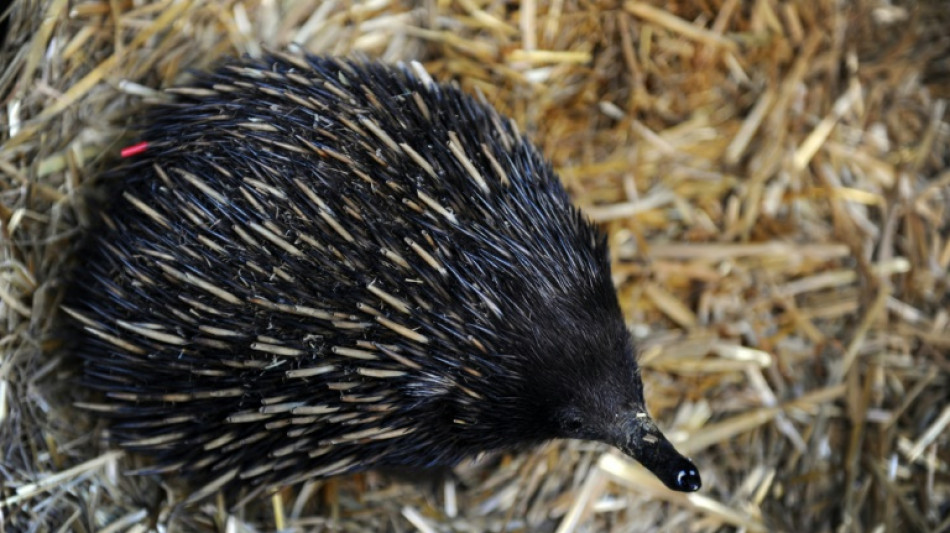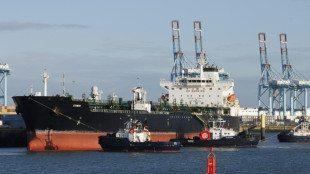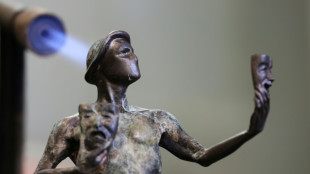
-
 Spurs have 'big problems' says Tudor as relegation risk persists
Spurs have 'big problems' says Tudor as relegation risk persists
-
Dortmund captain Can out for season with ACL tear

-
 Leweling doubles up as Stuttgart sink sorry Wolfsburg
Leweling doubles up as Stuttgart sink sorry Wolfsburg
-
Man Utd climb to third, Fulham sink sorry Spurs

-
 Iran strikes send VIP Dubai influencers 'back to reality'
Iran strikes send VIP Dubai influencers 'back to reality'
-
Briton Brennan bursts to Kuurne-Bruxelles-Kuurne triumph

-
 Activists pressure Milan Fashion Week to go fully fur-free
Activists pressure Milan Fashion Week to go fully fur-free
-
Blasts in Kabul as Afghan govt says responding to Pakistan attacks

-
 Iranians grieve, celebrate, worry after Khamenei's killing
Iranians grieve, celebrate, worry after Khamenei's killing
-
Latest developments as Iran lashes out after US-Israel strikes kill Khamenei

-
 West Indies post 195-4 against India in T20 World Cup do-or-die clash
West Indies post 195-4 against India in T20 World Cup do-or-die clash
-
South Africa 'embrace pressure' and favourites tag, says coach

-
 Tel Aviv residents say ready to withstand more Iranian attacks
Tel Aviv residents say ready to withstand more Iranian attacks
-
Russia loses key ally leader as Putin slams Khamenei 'cynical' killing

-
 AC Milan consolidate top-four credentials with win at Cremonese
AC Milan consolidate top-four credentials with win at Cremonese
-
Flights of fancy at Bottega Veneta, atmospheric mood at Armani in Milan

-
 Guardiola calls for respect after Ramadan break is booed
Guardiola calls for respect after Ramadan break is booed
-
Afghanistan warns Iran war will impact whole region

-
 Iran launches fresh strikes across Gulf after vowing revenge for slain leader
Iran launches fresh strikes across Gulf after vowing revenge for slain leader
-
OPEC+ hikes oil production by more than expected following outbreak of Iran war

-
 Goggia tightens grip on World Cup super-G with victory in Andorra
Goggia tightens grip on World Cup super-G with victory in Andorra
-
Belgium seizes Russian 'shadow fleet' tanker

-
 Raza steers Zimbabwe to 153-7 against South Africa
Raza steers Zimbabwe to 153-7 against South Africa
-
Kerr on target as Australia make winning start to Women's Asian Cup

-
 Marquez says 'unlucky' to retire from MotoGP season opener
Marquez says 'unlucky' to retire from MotoGP season opener
-
9 killed in pro-Iran protest at US consulate in Pakistan's Karachi

-
 Green clinches Singapore title with help from caddie husband
Green clinches Singapore title with help from caddie husband
-
More flights cancelled as Iran conflict shuts Mideast hubs

-
 'One Battle After Another' wins top producer award before Oscars
'One Battle After Another' wins top producer award before Oscars
-
Iran vows revenge for slain supreme leader despite Trump threat

-
 Flights of fancy at Bottega Veneta with shimmering, tactile collection
Flights of fancy at Bottega Veneta with shimmering, tactile collection
-
World Cup marks 100-day countdown amid political upheaval

-
 Bezzecchi wins MotoGP opener as Marquez retires
Bezzecchi wins MotoGP opener as Marquez retires
-
Pro-Iran protesters try to storm US missions in Pakistan, Iraq

-
 8 killed in pro-Iran protest at US consulate in Pakistan's Karachi
8 killed in pro-Iran protest at US consulate in Pakistan's Karachi
-
Latest developments after US, Israeli strikes kill Iran's Khamenei

-
 Before dawn, ancient drum rite wakes Istanbul faithful to fast
Before dawn, ancient drum rite wakes Istanbul faithful to fast
-
Music, mourning as Iran's Khamenei is killed

-
 Pakistan cricket's lack of T20 evolution exposed by World Cup exit
Pakistan cricket's lack of T20 evolution exposed by World Cup exit
-
Cobolli downs Tiafoe to claim Mexican Open

-
 Takele defends Tokyo Marathon title after sprint finish
Takele defends Tokyo Marathon title after sprint finish
-
Hollywood's finest gather for guild's Actor Awards

-
 Iran prepare for Women's Asian Cup as bombs drop on homeland
Iran prepare for Women's Asian Cup as bombs drop on homeland
-
Doncic shines as Lakers cruise past depleted Warriors

-
 3D tool Unreal Engine makes real impact in creative industries
3D tool Unreal Engine makes real impact in creative industries
-
OPEC+ mulls oil production increase in shadow of war

-
 Putin, Russia's eternal leader defined by war and power
Putin, Russia's eternal leader defined by war and power
-
Explosion, gunfire as Afghan forces shoot at aircraft over Kabul

-
 Iranians across North America rally for -- and against -- strikes
Iranians across North America rally for -- and against -- strikes
-
Shakespeare would have shunned streaming, 'Hamnet' team says


Study sheds light on origin of Australia's odd echidna
Australia's burrowing echidna evolved from a water-dwelling ancestor in an "extremely rare" biological event, scientists said Tuesday in a new study of the peculiar egg-laying mammals.
With powerful digging claws, protective spikes and highly sensitive beaks, echidnas are well suited to a life shuffling through the forest undergrowth.
But a team of Australian and international scientists believe many of the echidna's unusual traits were first developed millions of years ago when its ancestors splashed through the water.
"We're talking about a semiaquatic mammal that gave up the water for a terrestrial existence," said paleontologist Suzanne Hand, from the University of New South Wales.
"While that would be an extremely rare event, we think that's what happened with echidnas."
Echidnas and another Australian oddity, the semi-aquatic platypus, are believed to have evolved from a common ancestor called Kryoryctes cadburyi that lived in Australia more than 100 million years ago.
Researchers studied the single known bone fragment left by this ancestor, which was discovered among a trove of fossils at Dinosaur Cove in southern Australia some 30 years ago.
Platypus bones were similar to this ancient ancestor, Hand said, with a thick and heavy structure that provided ballast for diving.
Echidnas, in comparison, had very thin bone walls that made it easier to walk on land, Hand said.
This indicated echidnas were descended from a water-dwelling ancestor but had evolved to live on land, the research found.
It was far more common for prehistoric mammals to go from land to water, Hand said, pointing towards seals, whales, dolphins and dugongs.
The researchers said these findings appeared to be supported by other echidna traits.
Echidnas have backward-facing hind feet that help them shift mounds of soil when burrowing.
These feet may have first developed as rudders helping the echidna's ancestor navigate fast-moving waterways, Hand said.
Echidnas also have a "diving reflex" when submerged in water, which tells their body to conserve oxygen helping them hold their breath for longer.
Echidnas and platypus are monotremes, a rare group of mammals that lay eggs instead of live young.
"We're hoping we'll discover other ancestral monotremes that will help unravel the early history of this most fascinating group of mammals," said study co-author Michael Archer.
The research was published in peer-reviewed journal PNAS.
F.Bennett--AMWN


